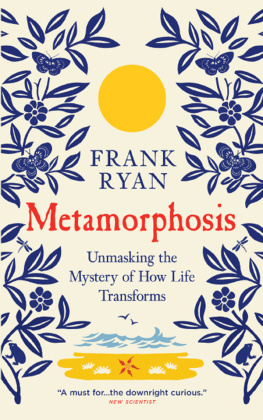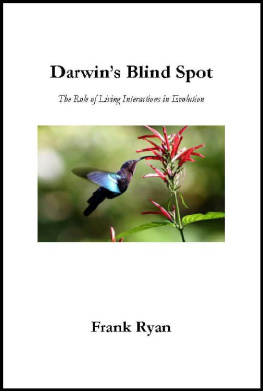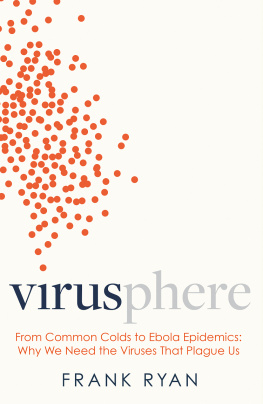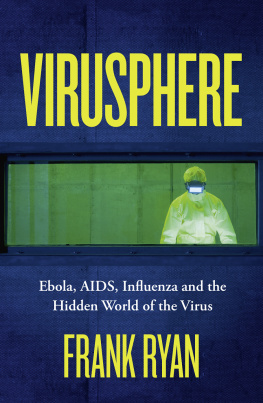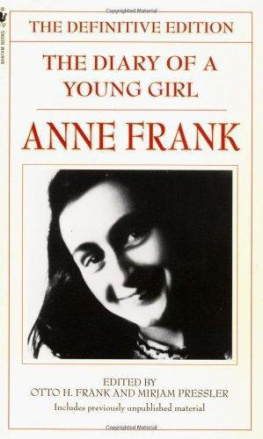Frank Ryan - Virolution (1st Edition)
Here you can read online Frank Ryan - Virolution (1st Edition) full text of the book (entire story) in english for free. Download pdf and epub, get meaning, cover and reviews about this ebook. year: 2009, publisher: Collins, genre: Science. Description of the work, (preface) as well as reviews are available. Best literature library LitArk.com created for fans of good reading and offers a wide selection of genres:
Romance novel
Science fiction
Adventure
Detective
Science
History
Home and family
Prose
Art
Politics
Computer
Non-fiction
Religion
Business
Children
Humor
Choose a favorite category and find really read worthwhile books. Enjoy immersion in the world of imagination, feel the emotions of the characters or learn something new for yourself, make an fascinating discovery.

- Book:Virolution (1st Edition)
- Author:
- Publisher:Collins
- Genre:
- Year:2009
- Rating:4 / 5
- Favourites:Add to favourites
- Your mark:
- 80
- 1
- 2
- 3
- 4
- 5
Virolution (1st Edition): summary, description and annotation
We offer to read an annotation, description, summary or preface (depends on what the author of the book "Virolution (1st Edition)" wrote himself). If you haven't found the necessary information about the book — write in the comments, we will try to find it.
Virolution (1st Edition) — read online for free the complete book (whole text) full work
Below is the text of the book, divided by pages. System saving the place of the last page read, allows you to conveniently read the book "Virolution (1st Edition)" online for free, without having to search again every time where you left off. Put a bookmark, and you can go to the page where you finished reading at any time.
Font size:
Interval:
Bookmark:
FRANK RYAN
The most important evolutionary book since Dawkins Selfish Gene

To the memory of Terry Yates, for the courtesy
and generosity of his help and the inspiration
that gave rise to this life-changing journey.
Science knows no country because it is the light that illuminates the world.
LOUIS PASTEUR
Like science, emerging viruses know no country. There are no barriers to prevent their migration across international boundaries or around the 24 time zones.
RICHARD M KRAUSE
A relatively small number of investigators have been preoccupied with the biology of viruses and how they tick; these scientists are more sensitive to the evolution of their symbiotic relations with their hosts.
JOSHUA LEDERBERG
I am quite sure that our views on evolution would be very different had biologists studied genetics and natural selection before and not after most of them were convinced evolution had occurred.
JBS HALDANE
In the opening line of his celebrated book, The Ascent of Man, Jacob Bronowski declared that man is a singular creature. He has a set of gifts which make him unique among the animals. Putting aside the now outmoded sexual conventions implicit in his terminology, our natural instinct is to believe he was right. Surely we humans are unique. We are unique in recognising, at sentient level, our own existence. We have risen above the other animals in the landscape so that, for good or for bad, we now shape and control that landscape. But does this intellectual uniqueness mean that we are so radically different that we should be set apart from all other life in our evolutionary origins, which have governed the very nature of our beings?
When, on 12 February 2001, two rival organisations announced simultaneously that they had completed the first comprehensive analysis of the human genome, surely this would have confirmed any such purported uniqueness of our human nature. Here, laid bare, for the first time in our history, was the complete library of our genes, the make-up of the 46 chromosomes that make us human. Alas, of any purported uniqueness it registered little. Nevertheless, it was remarkable for what it did reveal.
The first surprise was the modest size of the human genome, at about 20,000 genes. We had anticipated that our human complexity would have demanded 100,000, or more. To put it into perspective, we have only ten times as many genes as a bacterium, a third more than a fruit fly and not many more than a nematode worm. It seems that, at least in quantity of genomic memory, we are not vastly more complex than these humble life forms, though our genome is far more complex in the way we convert genes to proteins, so we can code for a great many more proteins with the same number of genes. Most revealing of all was the confirmation of our common inheritance with other forms of life on Earth. For example, we share 2,758 of our genes with the fruit fly, 2,031 with the nematode worm indeed, all three of us, human, fly, and worm, have 1,523 genes in common.
While some of my readers might feel humbled by this news, I suspect that Darwin would have been exhilarated because he would have realised that this shared inheritance could not have arisen by chance. We are familiar with the extreme accuracy of genetics in forensic science where a small piece of genetic coding can prove that a certain individual, and nobody else, committed a crime. To have 1,523 whole genes in common is rather more conclusive evidence I could not even begin to calculate the order of the odds of this happening by chance, whether billions or trillions to one. And this touches upon the reasons why evolutionary biology is among the most fascinating and important of the sciences, and indeed generally of human endeavours: it alone seeks, through the application of logic and experiment, to understand the origins of life, from its beginnings in such humble and terrible surroundings as existed on our newborn planet, to the beautiful and beguiling diversity we see on our fecund blue world today.
There are other great mysteries in the universe, for example in the forces of astronomy and in the minuscule yet equally wonderful world of particle physics, yet no other scientific study sets out to explain how, for example, we shapers-of-the-landscape came to be. The religiously devout may disagree, in attributing life to the creation of an omnipotent creator, but this viewpoint does not derive from science but from the application of faith. In my view, religion and science are based on different belief systems, and they ask quite different questions of those belief systems, so that little is to be gained in such comparative argument. But in one respect I will highlight an aspect I believe to be important. Creationists, including those proposing the anti-evolutionary philosophy of intelligent design, will proclaim that evolution is based upon a theory Darwins concept of natural selection so that, ultimately, the reality of evolution cannot be taken as proven. From this perspective, natural selection will never be capable of absolute proof, since a theory is a construct in logic, not fact. This view prevails among creationists in spite of the fact that scientists have subjected natural selection to remorseless experiment for some 150 years, and it has emerged ever victorious. Yet even here, at the very heart of such passion and division, I believe that a broader perspective is emerging, which is part and parcel of the wind of change blowing through evolutionary biology, and this is capable of offering the hard and irrefutable evidence needed.
Evolutionary theory has profound implications for society, as can be seen in the broad and diverse literature relating it to the humanities. Take the statement of the distinguished French biologist, Jacques Monod, who shared the Nobel Prize with fellow Frenchman, Franois Jacob, for work on the way living organisms control the production of proteins from their coding genes. In his book, Chance and Necessity, he made the telling statement Even today a good many distinguished minds seem unable to accept or even to understand that from a source of noise natural selection could quite unaided have drawn all the music of the biospheres. Monods book was published in 1970, ironically coinciding with first publication of the pioneering views of Lynn Margulis on the critical importance of symbiosis in the origin of nucleated cells, and of Susumu Ohno on the inevitability of gene and genomic duplication in the origin of animals and plants.
Im an admirer of Monod and his contribution to biology. But in evolutionary terms his viewpoint was exclusively reductionist and selectionist. Like most of his contemporaries, he believed that evolution took place through the action of natural selection on a single source of genetic change, mutation. Since the contribution of mutation was essentially random, its role was non-creative he even uses the term informationless. This is what he refers to as noise, a metaphor for random genetic change comparable to the static one hears on a radio. Only when the meaningless static the random mutations are moulded by natural selection, does meaningful sound emerge. I very much doubt that anybody has ever captured the zeitgeist of Modern Darwinism better. It is a seductive argument, beautifully amenable to the mathematical extrapolations of calculus in analysing selective fitness and population dynamics. How could it be wrong?
In fact it was not wrong it was simply a part, and not the remarkable whole, of the story. The humanities have been heavily swayed by such reductionist thinking, which is often, if understandably, misquoted as nihilistic in the rebuffs of angry creationists. In this book I shall paint a very different perspective of evolution than selection working on informationless noise. The core message of this book is that mutation what Monod has so brilliantly conceptualised is not the exclusive source of genetic, or, for that matter, genomic variation. It is my intention to prove, from an entirely scientific standpoint, that natural selection alone could not have given rise to the evolution of life, and its subsequent diversity, for it depends on a number of driving forces, each of which is an important source of hereditable genetic change, and without which selection would achieve nothing. Great evolutionary forces, such as symbiosis and hybridisation, are of vital importance to the variation that Darwin so desperately needed, and they invoke a creativity that is very different from, and far more powerful than, meaningless static. Indeed, they bring to their respective genomic unions novel combinations of meaningful pre-formed genes, to create virgin genomes with enhanced potential for survival. Our understanding of these other forces of evolution has been growing over the last decade or two, until, today, we can see that they too have played, and are still playing, important roles that taken together are equal with, and essentially complementary to, natural selection. This important and rapidly growing field of knowledge has never been drawn to public attention. In this book I shall show how these various driving forces are not theory but fact, which can be confirmed and thus proven with the tools of modern science indeed, they can be confirmed, repeatedly and predictably, with far greater certainty than that of the forensic scientist with his or her DNA confirmation of guilt or innocence.
Next pageFont size:
Interval:
Bookmark:
Similar books «Virolution (1st Edition)»
Look at similar books to Virolution (1st Edition). We have selected literature similar in name and meaning in the hope of providing readers with more options to find new, interesting, not yet read works.
Discussion, reviews of the book Virolution (1st Edition) and just readers' own opinions. Leave your comments, write what you think about the work, its meaning or the main characters. Specify what exactly you liked and what you didn't like, and why you think so.

